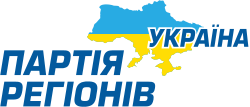地區黨
外觀
地區黨 Партія регіонів | |
|---|---|
 地區黨標誌 | |
| 領袖 | 集體領導[1][2] |
| 名譽主席 | 維克托·亞努科維奇[3] |
| 行政書記 | 鮑里斯·科列斯尼科夫[4][5] |
| 創始人 | 尼古拉·阿扎羅夫 尤赫姆·茲維亞吉爾斯基 弗拉基米爾·瓦西里耶維奇·雷巴克 |
| 成立 | 1997年10月26日 |
| 被禁 | 2023年2月21日 |
| 解散 | 2014年(事實上) |
| 繼承者 | 反對派平台(主要繼承政黨) |
| 總部 | |
| 黨報 | 地區時代 |
| 青年組織 | 青年地區 |
| 意識形態 | 社會民主主義[6][7] 文化保守主義[8] 地區主義[9][10] 親俄主義[11] 歐洲懷疑主義[12][9] 大帳篷主義[13][14][15] |
| 政治立場 | 中間偏左[16][17][18] |
| 國內組織 | 為了團結的烏克蘭!(2001年) |
| 歐洲組織 | 社會主義者和民主人士進步聯盟(合作,直至2014年) |
| 官方色彩 | 藍色 白色 [19][20][21][22] |
| 口號 | 強大的地區,強大的國家,富裕的人民! (俄語:«Сильные регионы, крепкая страна, богатые люди!») (烏克蘭語:«Сильні регіони, міцна країна, багаті люди!») |
| 黨旗 | |
 | |
| 官方網站 | |
| partyofregions | |
| 烏克蘭政治 政黨 · 選舉 | |
| 此條目有關於 |
| 烏克蘭親俄主義 |
|---|
|
|
地區黨(烏克蘭語:Партія регіонів;俄語:Партия регионов)是一個已不存在的烏克蘭社會民主主義和左翼保守主義政黨,成立於1997年10月。其支持者多位於烏克蘭東部或南部以說俄語人口為主的州。該黨立場親俄,反對北約東擴。2014年烏克蘭爆發親歐盟示威之後該政黨事實上被解散,2023年被烏克蘭政府取締。
歷史
[編輯]在2010年烏克蘭總統選舉中,地區黨提名前烏克蘭總理維克多·亞努科維奇為該黨總統候選人。2010年2月7日,亞努科維奇戰勝對手尤莉婭·季莫申科,當選為新一任的烏克蘭總統。
2014年2月24日,烏克蘭爆發親歐盟示威,亞努科維奇被地區黨開除出黨[23]。烏克蘭最高拉達副議長魯斯蘭·科舒林斯基宣布,已有63名議員宣布退出地區黨。另外,多個州的地區黨總部自行解散[24]。
2023年2月21日,烏克蘭行政上訴法院下令禁止地區黨活動。[25]
參考資料
[編輯]- ^ Yanukovych and Azarov are excluded from PR. Ukrayinska Pravda. March 29, 2014
- ^ Politics ""Party of Regions" has excluded Yanukovich, Arbuzov, Klimenko and proceeded to the form of collective management". Breaking news "NovostiMira". [2015-02-16].
- ^ 背景资料:乌克兰实行多党制 主要政党一览. 中國新聞社. 2014 (中文).
地區黨是烏克蘭第一大黨,立場為中左派。於1997年10月成立,最初稱地區復興黨,2001年3月更名為地區黨。主張建設繁榮昌盛的民主法制國家,通過誠實勞動建立以中產階級為主的公平、穩定社會。保護公民利益,主張俄語成為官方語言。前總統亞努科維奇曾為地區黨名譽主席。
- ^ Anna German: Boris Kolesnikov, de facto, is the leader of Party of Regions 網際網路檔案館的存檔,存檔日期2014-04-02.. Party of Regions. March 29, 2014
- ^ Reformed PR is headed by Borys Kolesnikov – Herman. Ukrayinska Pravda. March 29, 2014
- ^ В Партии регионов объяснили, какие они социал-демократы. Украинская правда. [2023-03-13].
- ^ Регионалы будут тренироваться вместе с эсдеками. Украинская правда. [2023-03-13].
- ^ 'It's Even Worse Than Before': How The 'Revolution Of Dignity' Failed LGBT Ukrainians. 自由歐洲電台/自由電台. 2018-11-21 (英語).
Shortly before the demonstrations began on November 21, 2013, Ukraine's parliament had passed the first reading of a bill that would have criminalized the spread of so-called "gay propaganda."[...]"There were many LGBTI people out there...in 2013 and 2014, protesting against the Yanukovych government’s repression and in support of democracy, dignity, and a closer relationship with Europe," said Matthew Schaff, Freedom House’s Ukraine office director.
- ^ 9.0 9.1 Nordsieck, Wolfram. Ukraine. Parties and Elections in Europe. 2014. (原始內容存檔於2018-06-12).
- ^ Barrington, Lowell, After Independence: Making and Protecting the Nation in Postcolonial and Postcommunist States, University of Michigan Press: 205, 2006, ISBN 978-0-47206898-2
- ^ Viktor Yanukovych's party claims victory. The Economist. 2012-10-29 [2015-10-07].
- ^ Arsenyi Svynarenko. Ukraine's political landscape is shifting. Politiikasta. 2014-08-29 [2015-07-28]. (原始內容存檔於2015-09-24).
- ^ Against All Odds:Aiding Political Parties in Georgia and Ukraine by Max Bader, Vossiuspers UvA, 2010, ISBN 978-9056296315 (page 82)
- ^ Strange Familiar Faces, The Ukrainian Week (15 September 2012)
- ^ Ideological Splits, The Ukrainian Week (10 March 2011)
- ^ Party System of Ukraine Before and After Maidan: Changes, Trends, Public Demand (PDF). National Security & Defence (Razumkov Centre). 2015, 6–7: 32.
A political project – the 「Socialists」 party has emerged in the political field, whose leadership included prominent representatives of the centre-left Party of Regions and V. Tsushko and L. Kozhar and the media reported on the possible involvement of A. Klyuyev in its funding.
- ^ Herb, Guntram H.; Kaplan, David H. 1989 to Present. Nations and Nationalism: A Global Historical Overview 4. ABC-CLIO. 2008: 1619. ISBN 978-1-85109-907-8.
Viktor Yanukovych, leader of the left-leaning Party of Regions, assumes the post of prime minister.
- ^ Potter, William C.; Mukhatzhanova, Gaukhar; Sokov, Nikolai. Ukraine: A Postnuclear Country. Forecasting Nuclear Proliferation in the 21st Century: Volume II. A Comparative Perspective. Stanford, California: Stanford University Press. 2010: 268. ISBN 978-0-8047-6971-6.
In all other cases mainstream Ukrainian politics-whether the center left (Party of Regions) or the center right (Our Ukraine-Bloc ofYulia Timoshenko) coalition-has tended to steer clear of the "pronuclear" stance.
- ^ Yulia Abibok. How Ukraine’s old guard are trying to get back into parliament. openDemocracy. 18 July 2019
- ^ Georgiy Avdeev. "Regionalists" without regions: What did "white-blues" forget to buy? («Регионалы» без регионов»: что забыли купить «бело-голубые»?) 網際網路檔案館的存檔,存檔日期2021-03-03.. Patriotic Forces of Donbas. 1 June
- ^ Oksana Denisova. How Oranges and White-Blues through middle of a night were dividing the Maidan (Как оранжевые и бело-голубые Майдан посреди ночи делили). Ukrayinska Pravda. 19 September 2007
- ^ Liubov Borschevskaya. Party of Regions creates work places. Kommersant.ru. 2 October 2007
- ^ 乌克兰地区党将亚努科维奇从党内除名. [2014-03-16]. (原始內容存檔於2014-03-16).
- ^ 乌克兰地区党议员呈现退党风潮. [2014-03-16]. (原始內容存檔於2014-03-16).
- ^ The court banned the Party of Regions. Ukrainska Pravda. 2023-02-21 [2023-02-21]. (原始內容存檔於2023-03-28) (烏克蘭語).
